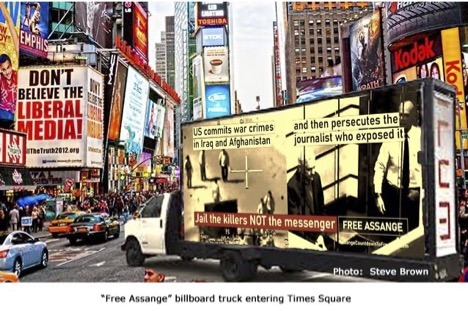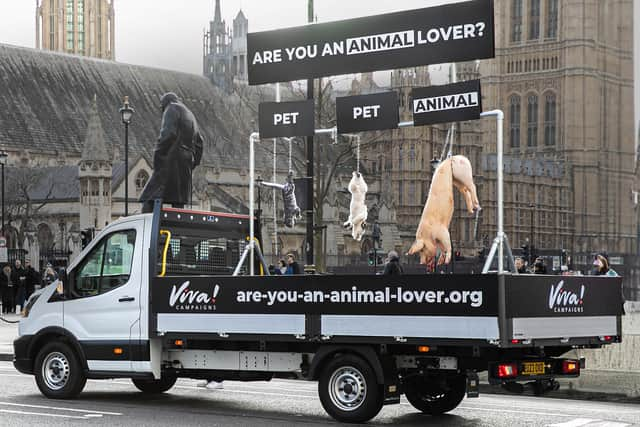
Starting Feb. 12 — and continuing every day until Feb. 20 — eight million New Yorkers and hundreds of millions of onlookers around the world will be watching as these giant 30-foot-long billboard trucks circle the British Consulate on 48th Street; the U.S. courthouses and federal buildings in Foley Square; the United Nations on First Avenue; the corporate headquarters of media influencers like The New York Times, Daily News, Hearst, NBC, CBS, ABC, CNN, MSNBC, Fox News, Reuters, Warner Bros and Paramount; and the plush venues of Wall Street power players likeJPMorgan Chase, Citibank, Bank of America, Goldman Sachs, Morgan Stanley, Wells Fargo, Barclays, Black Rock and American Express.
Why are the billboard trucks coming now? And why to New York?
Because Feb. 20 is “X-Day” for Juian Assange. That is when the Britain’s High Court of Justice will give Julian a last chance to block his extradition to the U.S. If his appeal is denied, U.S. Marshals will snatch him out of Southeast London’s gloomy Belmarsh Prison and fly him to the U.S. (possibly within 24 hours), where he will be tried under the Espionage Act for publishing videos that exposed U.S. war crimes in Afghanistan and Iraq.
So confident is the U.S. Justice Department that it will crush Julian’s Feb. 20 High Court appeal against extradition, that it has already assigned a U.S. judge to his case. He is District Judge Claude M. Hilton, and he will try Julian’s case in the notorious Albert V. Bryan U.S. Courthouse of the Eastern District of Virginia.
It should be understood that, in this district and this courthouse, the government almost never loses — because virtually everyone eligible to serve on a jury has a spouse or cousin or friend working for the government at the State Department, Justice Department, FBI or, most ominously, the CIA — whose Trump-appointed director, Mike Pompeo, famously plotted to poison or shoot Julian and dump his corpse at sea, and whose Langley headquarters just happens to be a 12-minute hop-skip-and-jump down the road from the Albert V. Bryan courthouse.
As Reuters rather admiringly notes (without touching on the obvious reason for such a splendid record of convictions),
“In the past 20 years, the U.S. government has racked up remarkable success rates in winning convictions or guilty pleas from people brought before the federal court in Virginia who were accused of espionage or terrorism. Because of its speed, the court is considered a “rocket docket.”
If Judge Hilton and the U.S. justice system find Assange guilty (Is water wet?), he will be locked away in a U.S. maximum security prison for up to 175 years. So his February 20 appeal before the High Court in London is crucial. How good are his chances?
That may depend on how much outrage and public pressure can be brought to bear on the British and American governments, since everyone knows that this is not really a legal case, to be scrupulously decided by dispassionate High Court judges solemnly parsing the law. It is a high-profile political case that the judges will decide (as British judges in this case have been deciding for the past 4 years) according to the wishes of powerful forces inside the CIA and M16.
Which is why the activist and political satirist Randy Credico, host of Julian Assange: Countdown to Freedom on WBAI-FM radio and the Progressive Radio Network (PRN), will be co-piloting huge “Free Assange” billboard trucks like this all over New York from Feb. 12 until the British High Court appeal date of Feb. 20.
Randy’s goal is to generate huge waves of provocative public noise in New York about Julien’s High Court appeal, as he did last year in Washington DC, where his mobile billboard trucks traversed the nation’s capital day after day, circling the British Embassy, the Department of Justice and the White House, alerting DC’s 700,000 residents and 22 million tourists to the years of illegal persecution and imprisonment that Julian suffered under Donald Trump, and continues to suffer under Joe Biden.
In Washington DC, Randy’s billboard trucks generated instant publicity and sympathy for Juian all over the world, and became a source of extreme embarrassment to U.S. and British leaders. Randy intends to generate even more public outrage by deploying his “Free Assange” billboard trucks in New York – at the crossroads of global media communications and financial power. These billboard trucks will be bigger and even harder to ignore than the Washington DC trucks — the better to increase public awareness and intensify the political pressure.
How many Assange billboard trucks will be coming to New York?
To lease these technologically sophisticated billboard trucks, create their giant 450-square-foot displays, and hire professional drivers to propel them around the city (with Randy co-piloting) is not cheap. The number of trucks will depend on how much money is raised for this campaign.
The cost of putting just one billboard truck on the streets of New York from Feb. 12 to Feb. 20 is $8,000. The final size of the fleet – two, three, four, even ten or more trucks — will depend on donations from people who care about Julian’s fate and the fate of investigative journalism.
For if Julian is convicted and imprisoned, any journalist, anywhere in the world, who dares to expose government crimes can be snatched from his country, dragged to the U.S., and imprisoned for life. That would end forever the historic role of a free press as the watchdog and guarantor of democracy and human rights.
Help Randy protect Julian Assange and freedom of the press
You can donate to the Assange Mobile Billboard Campaign at AssangeCountdownToFreedomcom. A contribution of $5, $10, $25 (or more if you can afford it) will assure it success, because there are more than enough of you reading this to make it happen.
Think of how good you will feel as you watch those “Free Assange” trucks go by, knowing that your donations are the fuel on which they run.
'Assange has not been convicted of any crime, but incarcerated solely for acquiring and publishing hundreds of thousands of classified documents, which exposed US state criminality'

Charlie Jaay is a freelance journalist with special interests in the environment, human rights and civil liberties.
On February 20 and 21, London’s Royal Courts of Justice will hear Julian Assange’s renewed application for appeal against extradition to the US, where he would face life imprisonment in a maximum security prison. This will be his last chance in the British courts to stop extradition, and will have huge implications not just for the defendant, but also human rights and press freedom around the world.
Award winning Journalist Julian Assange, founder of whistleblower site WikiLeaks, has been behind the bars of London’s Belmarsh prison since 2019. Once known as ‘Britain’s Guantanamo Bay’ because foreigners were detained without formally being charged, this maximum security prison is home to the country’s most dangerous criminals- serial rapists, drug barons, murderers and those serving sentences for terrorist-related crimes.
Assange has not been convicted of any crime, but incarcerated solely for acquiring and publishing hundreds of thousands of classified documents, which exposed US state criminality. These were leaked to WikiLeaks, in 2010, by former US army intelligence analyst, Chelsea Manning, and related to abusive and torturous treatment of detainees at Guantanamo Bay, and illegal actions of the United States’ military and intelligence agencies during the wars in Afghanistan and Iraq, and included information on the deaths of thousands of civilians.
Iraq Body Count records the death of civilians from violence, resulting from the 2003 military intervention in Iraq. It worked with WikiLeaks and various media outlets, to publish these Iraq War Logs, which laid bare the scale and impact of the war, and showed abuse and torture to be commonplace.
“Julian Assange is the single most important journalist of our generation, not only because of the stories he broke but because, with WikiLeaks, he advanced the profession itself and its potential for public good”, says Hamit Dardagan, Iraq Body Count Co-founder.
“For Iraq this meant that some 15,000 otherwise unreported violent deaths of Iraqi civilians, known to the US military but kept from public knowledge, could be revealed. Revealed not just as a bare statistic, but with the how, when, where and, in many cases, by whom they were killed. And sometimes too, providing hitherto undisclosed identifying details including their names— no small matter when so many Iraqi families were still desperately searching for their missing loved ones.
“That such a journalist is being entombed in a maximum security prison exposes once more who poses the real threat to freedom, including freedom of thought”, Dardagan adds.
The US government argued that the leak contained sensitive information- including the war crimes themselves and, as a result, submitted an extradition request to the British government in 2019. If extradited to the US, Assange will stand trial for violating the 1917 Espionage Act, because he received and published classified documents, and will face up to 175 years in a maximum security prison.
Being at the centre of legal battles for more than a decade, is now taking its toll on his health. In 2021, after more than 100 doctors expressed their concern, demanding an ‘end (of his) torture and medical neglect’, and transference from Belmarsh Prison, his extradition was blocked by the British courts, because of the ‘substantial’ risk of suicide. However, in 2022, his extradition was approved by Home Secretary Priti Patel, resulting in a legal appeal against the US extradition order, in June of last year, which was unsuccessful.
Richard Burgon, Labour MP for Leeds East, has co-ordinated a cross-party group of parliamentarians who have repeatedly called for the charges to be dropped.
”Let’s remember it was Donald Trump’s administration that brought the charges against Mr Assange for his role in publishing evidence of war crimes, corruption and human rights abuses”, Burgon says.
“We simply cannot stand by while common practices in journalism – practices that have long served the public interest – are criminalised in this way. Now is the moment to put an end to this prosecution, drop the charges and allow him to return home.”
Assange’s supporters, including the UN Special Rapporteur on Torture, Alice Jill Edwards, have tirelessly called for the UK government to halt the possible extradition plans. The International Federation of Journalists has called for his immediate release, launching the Free Assange Now! campaign which has support from Journalist’s unions around the world, including the National Union of Journalists (NUJ), which has also organized events in support of Assange.
“The NUJ is opposed to ongoing efforts by the United States to extradite Julian Assange and has condemned the UK’s complicity through its recent approval of his extradition”, says Michelle Stanistreet,NUJ General Secretary. “Journalists have voiced their disbelief at wider ramifications for journalism and the ability to publish public interest stories involving the US government if their dogged pursuit continues any longer.”
According to Simon Crowther, Amnesty International Legal Adviser, Freedom of Expression is protected under international human right’s law, and if the UK facilitates this extradition it would then be violating its obligations, to which it is bound, under international law.
“Assange is being prosecuted for publication of classified material, in the public interest, which is a journalist’s job, and something they do all the time without being prosecuted for espionage as a result, nor are they snatched from another country for that to happen”, he says.
Charging Assange under the Espionage Act, for exposing public interest material, is an attack on the public’s ability to obtain truthful information. If the US gets its way, we will have a clear legal precedent saying if classified information is published, any state can seek the extradition of the person who published it, and prosecute them, wherever in the world they may be. This will affect every newsroom, with journalists having to be mindful of what they do and do not publish, and will pose a major threat to investigative journalism and press freedom. If the powerful cannot be held to account then this will seriously threaten democracy.
Crowther also warns that Assange risks being placed under Special Administrative Measures– rules often used in the US, to restrict the contact dangerous prisoners may have with the outside world.
“There is a very real risk of torture and other cruel and degrading treatment or punishment. Solitary confinement is frequently used in the US, the implications of which are grossly underestimated by the global public. If someone is put in prolonged solitary confinement it breaks them. It has profound implications and is very well documented”, he says.
“Although the UK has sought a diplomatic agreement from the US, that Julian Assange wouldn’t be put under one of these Special Administrative Measures, if extradited, unfortunately these are never legally binding. And, even then, this diplomatic agreement says that unless circumstances change, Assange continues to be a risk to confidential information”, Crowther explains.
“Our government has been complicit. They certified this, and Amnesty argues the UK is breaching its human rights obligations if Assange is extradited. The UK has a clear international obligation not to send people to places where they are at risk of torture or degrading treatment.”
Assange’s case is now at a critical juncture, his life hangs in the balance. The UK protest will take place outside London’s Royal Courts of Justice, 8.30am, February 20 and 21.








